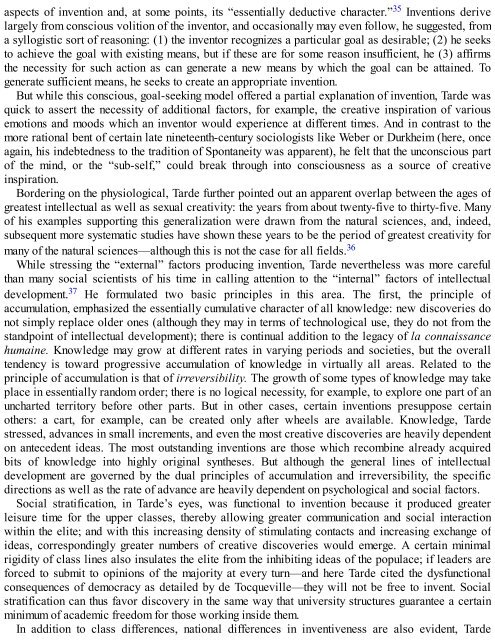3658925934
Create successful ePaper yourself
Turn your PDF publications into a flip-book with our unique Google optimized e-Paper software.
aspects of invention and, at some points, its “essentially deductive character.” 35 Inventions derive<br />
largely from conscious volition of the inventor, and occasionally may even follow, he suggested, from<br />
a syllogistic sort of reasoning: (1) the inventor recognizes a particular goal as desirable; (2) he seeks<br />
to achieve the goal with existing means, but if these are for some reason insufficient, he (3) affirms<br />
the necessity for such action as can generate a new means by which the goal can be attained. To<br />
generate sufficient means, he seeks to create an appropriate invention.<br />
But while this conscious, goal-seeking model offered a partial explanation of invention, Tarde was<br />
quick to assert the necessity of additional factors, for example, the creative inspiration of various<br />
emotions and moods which an inventor would experience at different times. And in contrast to the<br />
more rational bent of certain late nineteenth-century sociologists like Weber or Durkheim (here, once<br />
again, his indebtedness to the tradition of Spontaneity was apparent), he felt that the unconscious part<br />
of the mind, or the “sub-self,” could break through into consciousness as a source of creative<br />
inspiration.<br />
Bordering on the physiological, Tarde further pointed out an apparent overlap between the ages of<br />
greatest intellectual as well as sexual creativity: the years from about twenty-five to thirty-five. Many<br />
of his examples supporting this generalization were drawn from the natural sciences, and, indeed,<br />
subsequent more systematic studies have shown these years to be the period of greatest creativity for<br />
many of the natural sciences—although this is not the case for all fields. 36<br />
While stressing the “external” factors producing invention, Tarde nevertheless was more careful<br />
than many social scientists of his time in calling attention to the “internal” factors of intellectual<br />
development. 37 He formulated two basic principles in this area. The first, the principle of<br />
accumulation, emphasized the essentially cumulative character of all knowledge: new discoveries do<br />
not simply replace older ones (although they may in terms of technological use, they do not from the<br />
standpoint of intellectual development); there is continual addition to the legacy of la connaissance<br />
humaine. Knowledge may grow at different rates in varying periods and societies, but the overall<br />
tendency is toward progressive accumulation of knowledge in virtually all areas. Related to the<br />
principle of accumulation is that of irreversibility. The growth of some types of knowledge may take<br />
place in essentially random order; there is no logical necessity, for example, to explore one part of an<br />
uncharted territory before other parts. But in other cases, certain inventions presuppose certain<br />
others: a cart, for example, can be created only after wheels are available. Knowledge, Tarde<br />
stressed, advances in small increments, and even the most creative discoveries are heavily dependent<br />
on antecedent ideas. The most outstanding inventions are those which recombine already acquired<br />
bits of knowledge into highly original syntheses. But although the general lines of intellectual<br />
development are governed by the dual principles of accumulation and irreversibility, the specific<br />
directions as well as the rate of advance are heavily dependent on psychological and social factors.<br />
Social stratification, in Tarde’s eyes, was functional to invention because it produced greater<br />
leisure time for the upper classes, thereby allowing greater communication and social interaction<br />
within the elite; and with this increasing density of stimulating contacts and increasing exchange of<br />
ideas, correspondingly greater numbers of creative discoveries would emerge. A certain minimal<br />
rigidity of class lines also insulates the elite from the inhibiting ideas of the populace; if leaders are<br />
forced to submit to opinions of the majority at every turn—and here Tarde cited the dysfunctional<br />
consequences of democracy as detailed by de Tocqueville—they will not be free to invent. Social<br />
stratification can thus favor discovery in the same way that university structures guarantee a certain<br />
minimum of academic freedom for those working inside them.<br />
In addition to class differences, national differences in inventiveness are also evident, Tarde









![Genki - An Integrated Course in Elementary Japanese II [Second Edition] (2011), WITH PDF BOOKMARKS!](https://img.yumpu.com/58322134/1/180x260/genki-an-integrated-course-in-elementary-japanese-ii-second-edition-2011-with-pdf-bookmarks.jpg?quality=85)
![Genki - An Integrated Course in Elementary Japanese I [Second Edition] (2011), WITH PDF BOOKMARKS!](https://img.yumpu.com/58322120/1/182x260/genki-an-integrated-course-in-elementary-japanese-i-second-edition-2011-with-pdf-bookmarks.jpg?quality=85)





